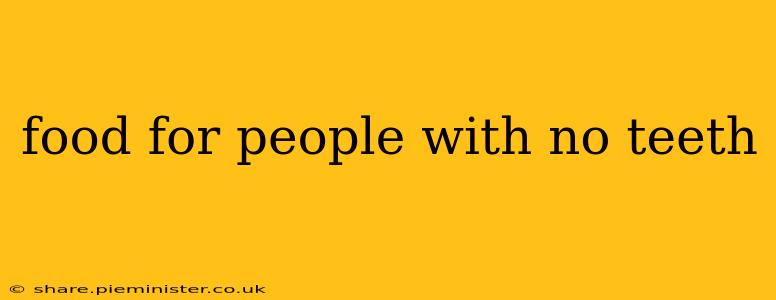Losing your teeth can significantly impact your diet, but it doesn't mean you have to compromise on nutrition or enjoyment. This comprehensive guide explores delicious and easily digestible food options for people with no teeth, focusing on soft textures and nutrient-rich ingredients. We'll address common concerns and offer practical advice to help you maintain a healthy and satisfying diet.
What are the best foods for people with no teeth?
The key is to focus on foods that are soft, easily mashed, or require minimal chewing. This often involves choosing cooked and well-prepared options. Here are some excellent choices:
-
Soft Cooked Vegetables: Steamed or boiled vegetables like carrots, potatoes, squash, and sweet potatoes become incredibly tender when cooked thoroughly. You can further puree them for a smoother consistency.
-
Well-Cooked Fruits: Ripe bananas, peaches, mangoes, and berries are naturally soft. Applesauce and cooked pears are also excellent options.
-
Soups and Stews: Nutrient-rich soups and stews, especially those with well-cooked vegetables and tender meats (like chicken or fish), provide a complete meal that's easy to consume. Avoid chunky soups and stews.
-
Yogurt and Smoothies: These are excellent sources of protein and calcium, crucial for overall health. Blend yogurt with fruits, vegetables, and even protein powder for a nutritional boost.
-
Pureed Foods: Many meals can be easily pureed using a blender or food processor. This allows you to enjoy a wide variety of flavors and nutrients in a soft, easily digestible form. Think pureed soups, mashed potatoes, or even pureed meats.
-
Mashed Beans and Lentils: Lentils and beans, when cooked properly, become soft and are packed with protein and fiber. Mash them for easier consumption.
What kind of foods should I avoid if I have no teeth?
Foods that are hard, crunchy, or require significant chewing should be avoided to prevent injury or discomfort. This includes:
-
Raw vegetables: Unless extremely soft, such as ripe tomatoes, most raw vegetables require chewing.
-
Nuts and seeds: These are very hard and pose a choking hazard.
-
Tough meats: Unless extremely well-cooked and tender, tougher cuts of meat are difficult to consume without teeth.
-
Hard breads and crackers: These can be difficult to manage and pose a choking risk.
-
Popcorn and chips: These are crunchy and pose a significant choking hazard.
What are some tips for eating when you have no teeth?
-
Cut food into small pieces: Even soft foods can be easier to manage when cut into smaller, bite-sized portions.
-
Eat slowly and mindfully: Take your time, chew thoroughly (as much as possible), and pay attention to your body's signals.
-
Stay hydrated: Drinking plenty of water helps with swallowing and digestion.
-
Consider nutritional supplements: Consult your doctor or a registered dietitian to ensure you are getting all the necessary nutrients. They might recommend specific supplements.
-
Experiment with different textures and flavors: Don't be afraid to try new things and find what works best for you.
Can I still eat meat if I have no teeth?
Yes, you can still enjoy meat, but it needs to be very well-cooked and tender. Ground meats, chicken breast, and fish are good options. Stewing or slow cooking helps to break down the muscle fibers, making them easier to consume. Consider pureeing meats if necessary.
Are there any special appliances that can help me eat?
Dentures are the most common solution for people without teeth. However, even with dentures, you might still find some foods easier to consume than others. Your dentist can advise you on the best options for your specific situation.
What are the nutritional needs of someone with no teeth?
Maintaining a balanced diet is crucial. Focus on getting enough protein, calcium, vitamins, and minerals. Consult a registered dietitian or your doctor to create a personalized nutrition plan that meets your specific needs. They can help you assess any nutrient deficiencies and suggest ways to overcome them.
This guide provides a starting point for planning nutritious and enjoyable meals without teeth. Remember to consult with healthcare professionals for personalized advice tailored to your individual needs and health status. Eating well is essential regardless of your dental situation.
